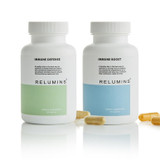Benefits of Relumins Immune Defense is an original immune system support formula!
A well-balanced diet is the best way to maintain a strong immune system. But nutritional supplements are a convenient and easy way to ensure that nutritional needs are met.
Research/Ingredient Benefits:
Vitamin D:
Scientists have found that vitamin D is crucial to activating our immune defenses and that without sufficient intake of the vitamin - the killer cells of the immune system -- T cells -- will not be able to react to and fight off serious infections in the body.
[1] Vitamin D crucial to activating immune defenses.
Vitamin C:
Vitamin C is an essential micronutrient for humans, with pleiotropic functions related to its ability to donate electrons.
[2] Vitamin C and Immune Function
Quercetin, Inflammation and Immunity:
Quercetin, a flavonoid found in fruits and vegetables, has unique biological properties that may improve mental/physical performance and reduce infection risk.
[3] Quercetin, Inflammation and Immunity
Herbal Immunostimulants:
Traditional herbal medicine provides several remedies for strengthening the body’s resistance to illness through effects on immune system components. This review article examines 3 popular herbal immune stimulants that are often of interest to cancer patients. Echinacea, a native of North America, is widely used to prevent, or provide early treatment for, colds.
[4] Immune System Effects of Echinacea, Ginseng, and Astragalus

Vitamin A (as Retinyl Palmitate), Vitamin C (Ascorbic Acid), Vitamin D3 (as D-Alpha Tocopheryl Succinate), Niacin (as Niacinamide), Vitamin B6 (as Pyridoxine HCI), Zinc (as Zinc Oxide), Selenium (as Selenomethionine), Bitter Orange Fruit Extract (40% Hesperidin), Quercetin (from Sophora Japonica Bud Extract), Astragalus Root 4:1 Extract, Turmeric Root Extract (95% Curcuminoids), Citrus Bioflavonoid Complex (from Orange, Lemon, Grapefruit Peel), Lactoferrin 95%
Other Ingredients: Vegetable Cellulose (Capsule), Magnesium Stearate, Silicon Dioxide, Microcrystalline Cellulose





